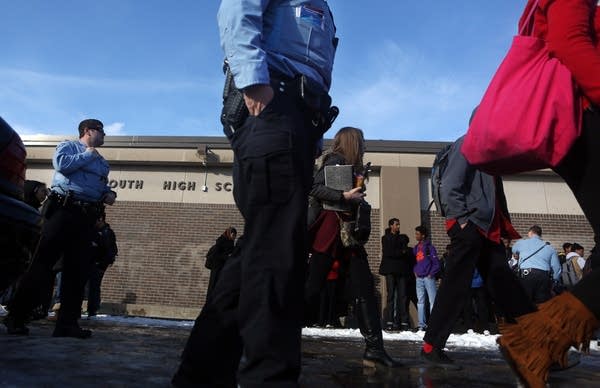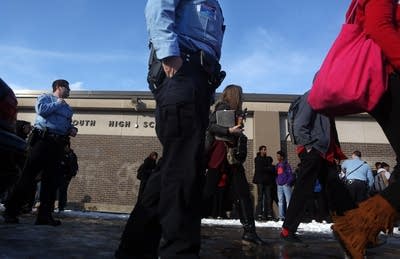After South High brawl, Somali students say they don't feel safe
Go Deeper.
Create an account or log in to save stories.
Like this?
Thanks for liking this story! We have added it to a list of your favorite stories.

Some Somali students say not enough is being done to ease racial tension at South High School in Minneapolis, which just last week was the site of a brawl involving hundreds of students.
Some claim the fight was the result of months of rising tension between Somali students and other groups of students.
Minneapolis school district officials are still investigating the incident, which sent three students and a staff member to the hospital with minor injuries.
District officials are also looking into the actions of school staff and police officers as part of the investigation.
Turn Up Your Support
MPR News helps you turn down the noise and build shared understanding. Turn up your support for this public resource and keep trusted journalism accessible to all.
Somali students said they feel alienated, and at times unsafe, in their school.
"Nobody listens to us, nobody understands what we're talking about," said 16-year-old student Kowsar Mohamed as she choked back tears. "It's the fact that we go somewhere for education but we don't feel safe."
For Sophomore Anisa Ahmed, the problem at South, where 8 percent of the 1,700 students are Somali, is there are too few teachers and counselors who are Somali.
"We feel like it's just us and only us together," Ahmed said. "That's the reason why I feel this happened, because we don't have a voice and we don't have anybody there to protect us or to even talk to us about this situation."
The student's told their stories during a news conference organized by Minneapolis school board member Hussein Samatar, who became the first Somali-American in Minnesota voted into public office when he was elected just over two years ago.

Samatar downplayed the notion that the fight rose out of tension between Somali students and African American and Native American students, as some have said.
Samatar says the problem is the district's leaders aren't doing enough to make Somali students feel welcome, something he wants to change.
"We will direct our superintendent to do the right thing for all the students. Specifically South High: We've had security issues, and safety and more about leadership and cultural competencies within the school itself."
Minneapolis Public Schools CEO Rick Mills told Somali students and parents that in the wake of last week's fight, district leaders are still planning what they'll do next.
"We are at the beginning of the necessary learning process and are confident that adults and students alike can grow from this experience," he said.
Meantime, some Somali students said they were called "animals" by an officer responding to the fight.
Last night, after the news conference, Minneapolis Police Chief Janee Harteau said in a statement that she takes the allegations seriously and she's opened an internal review into the actions of the officers responding to the fight.
The department "values the strong relationships we have built with the Somali and East African communities," Harteau said.
The South High School fight comes just weeks after an uproar over another racially charged incident at Minneapolis' Washburn High School. There, a group of students hung a dark skinned doll, took pictures of it and posted them on social media websites.
District officials have been tight lipped about what happened to the students involved at Washburn, citing state laws on data privacy.
At South High School, a student group is trying to repair relationships after last week's fight.
Students Together As Allies For Racial Trust, or S.T.A.R.T., is planning events to bring students from different cultures together to discuss issues of race. The group will begin its work tonight, by hosting dinner and conversation for any South High student who wants to attend.
"Racism is something that really needs to be addressed and we really need to teach students cultural competency in our schools," said Saida Mahamud, a member of the group. "That's something that's very important."




